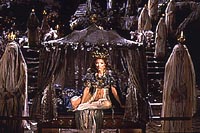
Years ago I got into trouble while participating in a daylong panel discussion on Shakespeare and the movies by suggesting that if the Bard were alive today, he’d be writing film scripts. The point I was trying to make was not about the noxious effect of Hollywood on artists: That argument has already been made, in another context, by Paul Mazursky, who said that if Alexander Solzhenitsyn had moved to Beverly Hills instead of Vermont he’d be writing episodes of Police Story from his hot tub. No, my point was simply that Shakespeare, in addition to everything else, had the most “cinematic” of imaginations. Reading his plays is a far greater visual experience than watching most movies. Inevitably, the films derived from his dramas are diminutions. Who can hope to compete with the imagery conjured up by his language? And yet there have been directors – such as Orson Welles in Othello and Chimes at Midnight, and Kurosawa in his Macbeth adaptation Throne of Blood – who have brought their own voluptuous rage and passion to the Shakespearean panorama and, in so doing, honor both the playwright and the movie medium. And, of course, the greatest Shakespearean screen actors are always better than we could ever have imagined on our own. When Laurence Olivier is Othello, he’s Shakespeare’s collaborator; he’s not merely acting the part but realizing it.
A Midsummer Night’s Dream – with its fairy king and queen and sprites, its oafish players and star-crossed, cross-eyed lovers, its pomp and slapstick and filigree – is one of the most opulent and movie-ish of Shakespeare’s plays. (It’s been filmed often, most memorably in the 1935 Max Reinhardt production with Jimmy Cagney as Bottom and Mickey Rooney as Puck.) The best thing about the new movie version of A Midsummer Night’s Dream, which stars Kevin Kline as Bottom and a radiantly gauzy Michelle Pfeiffer as Titania, is that it doesn’t try to set itself up as some radical reinterpretation. Neither does it punch up Shakespeare with a lot of galumphing calisthenics designed to show us how danged enjoyable the old guy can be. (This was the Shakespeare in Love approach, and may have been the key to its success; the filmmakers treated us all like precocious groundlings.) This new Midsummer Night’s Dream is, thankfully, not a work of genius; it’s captivatingly modest. The director, Michael Hoffman, who transposes the play’s setting from Athens to late-1800s Tuscany while keeping most everything else intact, is content to treat the play as a showcase for his superb performers, who also include Rupert Everett as Oberon, Calista Flockhart as Helena, Anna Friel as Hermia, and Stanley Tucci as the horned Puck. Hoffman isn’t much of a conjurer; his poetic effects – lots of arboreal dew and fairy dust and golden light – are a sugar-dipped mélange of pre-Raphaelite and faux Etruscan and Maxfield Parrish. But there’s a sly knowingness to his method that redeems it. A Midsummer Night’s Dream, after all, is about how the base is transformed into the blessed. Hoffman transmutes the heavy syrup of kitsch into Shakespearean nectar.
As it’s performed here, A Midsummer Night’s Dream is a supremely joyous play. No Jan Kott broodings for this bunch. Inevitably, the comical catastrophe of love sorts itself out – whether that love be unrequited, like Helena’s for Hermia’s suitor Demetrius (Christian Bale), or blind, like the fairy queen Titania’s for Bottom, with his ass’s ears and furry cheeks. Just about everybody ends up paired off in the best of ways. The sprites and nymphs of the forest are naughty jesters, but they’re romantics as well; they know they have to undo their whammies and make things right. Only one of the lovers is left lovelorn: the lowly, princely Bottom, whose transcendent tryst with Titania gives him a glimpse of the ethereal he can’t dispel. For most of the way, Kevin Kline is marvelously robust and hammy, but ultimately his Bottom has a touch of the forlorn about him. Whose dream is being dreamt in A Midsummer Night’s Dream? That’s always been one of the play’s resonant mysteries. In Hoffman’s movie, the dream belongs to Bottom, and he’s sad in the end for having woken up.